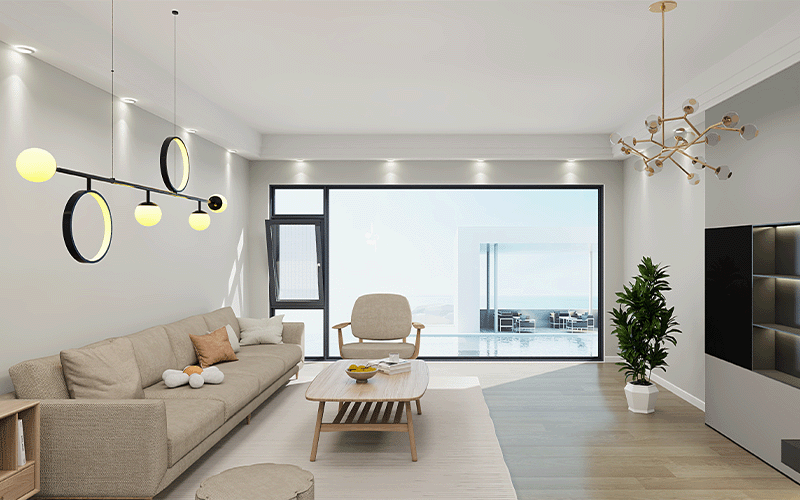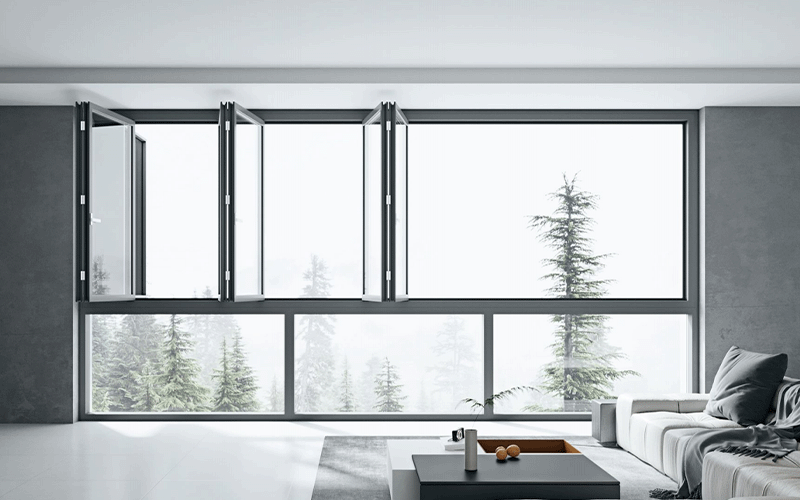When it comes to upgrading or building a home, windows are often one of the most important decisions. They don't just bring in natural light; they also affect insulation, style, durability, and even the resale value of your property. Two of the choices on the market today are aluminum windows and PVC (also called uPVC) windows.
The truth is, there isn't a single “best” option. Both aluminum and PVC windows have their own advantages and disadvantages depending on your budget, style preferences, and long-term plans. In this article, we'll dive deep into the comparison, looking at durability, maintenance, design, cost, and energy performance. By the end, you'll have a clear idea of which material might be the most suitable for your home project.
Aluminum Windows
Aluminum windows are made using frames built from aluminum alloys. They're known for their sleek appearance, modern style, and exceptional strength. Because aluminum is naturally lightweight yet tough, these windows can hold large panes of glass without looking bulky, making them a favorite for contemporary homes, high-rise apartments, and commercial buildings.
Key advantages of aluminum windows:
● Slim frames for more natural light.
● High strength and durability.
● Wide range of powder-coated colors and finishes.
● Long lifespan with minimal warping or cracking.
Smooth Operation Aluminum Folding Window
What Are PVC (uPVC) Windows?
PVC windows, often referred to as uPVC windows (unplasticized polyvinyl chloride), are made from a type of plastic material. They are one of the most affordable and widely used window options in residential construction.
Unlike regular plastic, uPVC is rigid, resistant to moisture, and doesn't easily bend or warp, making it a solid choice for homeowners looking for a low-maintenance, budget-friendly option.
Key advantages of PVC windows:
● Lower cost compared to aluminum.
● Good insulation properties.
● Low maintenance—no painting required.
● Wide availability in many standard designs.
Durability: Which Lasts Longer?
When you're investing in windows, you want them to last for decades.
Aluminum Windows: Aluminum frames are exceptionally durable. They can withstand heavy rain, strong winds, and extreme sunlight without warping. They're also resistant to termites and other pests. With proper installation and occasional cleaning, aluminum windows can last 30 to 40 years or more.
PVC Windows: PVC windows are also durable, but not quite as tough as aluminum. They generally last about 20 to 30 years, depending on the quality and climate conditions. In very hot or very cold environments, PVC can sometimes expand or contract, which may cause minor issues over time.
Energy Efficiency and Insulation
Energy performance is a huge factor in modern homes. Good insulation means lower heating and cooling bills.
PVC Windows: PVC is a natural insulator. The material itself doesn't conduct heat, which makes uPVC windows very effective at keeping your home warm in winter and cool in summer. Many PVC windows also come with multi-chambered frames that add extra insulation.
Aluminum Windows: In the past, aluminum windows were not great at insulation because metal conducts heat. However, modern aluminum windows now include a “thermal break”—a plastic section between the inside and outside of the frame that reduces heat transfer. With this technology, high-quality aluminum windows can be just as energy-efficient as PVC.
PVC windows are slightly ahead for natural insulation, but modern aluminum windows with thermal breaks are highly competitive.
Design and Aesthetic Appeal
Your windows affect the entire look of your home.
Aluminum Windows: If you love a modern, minimalist design, aluminum is the clear winner. The slim frames allow for larger glass panels, which means more natural light and uninterrupted views. Aluminum windows also come in a huge variety of colors and finishes, from matte black to metallic silver.
PVC Windows: PVC windows are more limited in style. Most come in white or off-white, although some manufacturers now offer wood-effect finishes. However, PVC frames tend to be thicker, which may slightly reduce the glass area.
Aluminum windows are better for homeowners who prioritize style and customization.
Maintenance: Which Is Easier to Care For?
Aluminum Windows: Aluminum doesn't rust or warp, but it can sometimes develop condensation or minor corrosion if installed in coastal areas with salty air. Regular cleaning and occasional lubrication of hinges are usually enough.
PVC Windows: PVC is almost maintenance-free. You don't need to paint or treat the frames, and they can be cleaned easily with soap and water. However, white PVC can discolor over time if exposed to strong sunlight.
PVC windows require slightly less maintenance overall.
Cost Comparison
Budget plays a huge role in decision-making.
PVC Windows: PVC windows are the more affordable option upfront. They are widely available, mass-produced, and cheaper to install.
Aluminum Windows: Aluminum windows are more expensive because of their strength, design flexibility, and longer lifespan. However, many homeowners see them as a long-term investment because they may not need replacement as soon as PVC.
PVC windows for short-term savings, aluminum windows for long-term value.
Noise Insulation
If you live near a busy road or noisy area, you'll want windows that reduce outside noise.
PVC Windows: Known for better sound insulation due to their thicker frames and natural insulating properties.
Aluminum Windows: Can also perform well with double or triple glazing, but aluminum frames alone don't block as much sound as PVC.
Eco-Friendliness
Today, many homeowners care about sustainability.
Aluminum Windows: 100% recyclable without losing quality. Aluminum can be reused indefinitely, making it one of the most eco-friendly building materials.
PVC Windows: Recycling is possible, but more difficult. The material can release toxins when burned, and the recycling process isn't as sustainable.
Aluminum windows for environmentally conscious homeowners.
Common Applications
Aluminum Windows: Popular for modern villas, commercial buildings, high-rise apartments, and custom-designed homes. Perfect when large glass walls or sliding doors are needed.
PVC Windows: Common in suburban homes, rental properties, and smaller projects where budget is the main concern.
Aluminum Windows vs. PVC Windows: A Quick Comparison
Here's a comparison to make the differences clearer:
|
Feature |
Aluminum Windows |
PVC (uPVC) Windows |
|
Durability |
30–40 years lifespan, resistant to weather and pests |
20–30 years lifespan, may warp in extreme climates |
|
Energy Efficiency |
Modern models with thermal breaks perform well |
Naturally insulating, great for heat and sound |
|
Design & Style |
Slim frames, modern look, customizable colors/finishes |
Thicker frames, mostly white or limited finishes |
|
Maintenance |
Low maintenance, may need corrosion check in coastal areas |
Almost maintenance-free, easy to clean, but can discolor |
|
Cost |
Higher upfront investment, better long-term value |
More affordable, budget-friendly |
|
Noise Insulation |
Good with double glazing, but metal transmits sound |
Naturally better sound insulation |
|
Eco-Friendliness |
Fully recyclable, sustainable choice |
Less eco-friendly, recycling process more complex |
|
Best Applications |
Modern villas, high-rise buildings, custom projects |
Suburban homes, rentals, budget projects |
Which Should You Choose?
Aluminum or PVC windows? Here's a quick summary:
Choose aluminum windows if you want:
● A modern look with slim frames.
● Long lifespan and strong durability.
● Custom colors and finishes.
● Eco-friendly material.
Choose PVC windows if you want:
● A lower initial cost.
● Low maintenance with decent insulation.
● Better noise reduction.
● A simple, practical option for residential homes.
At the end of the day, it's not about which material is “better”. It's about which one is more suitable for your home, lifestyle, and budget.
Conclusion
There's no universal answer to the aluminum vs. PVC debate. Each has its strengths, and the right choice depends on your goals.
● If you're building a modern home and see windows as a long-term investment, aluminum is often the way to go.
● If you're renovating on a budget and need something functional and cost-effective, PVC may be the smarter choice.
If you're considering aluminum windows, it's worth investing in a trusted manufacturer. Jingyu offers a one-stop solution for custom aluminum windows, including popular styles like sliding windows, casement windows, folding windows, and large panoramic designs. With Jingyu, you get not only quality but also flexibility in design to match your home perfectly. Browse our aluminum window category for more.


